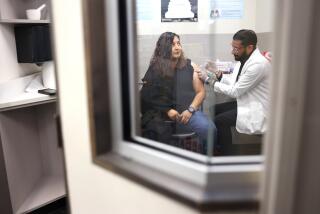Seniors Also Need Their Shots
For many seniors, doctor visits, medications and treatments are all parts of aging. But vaccinations, they assume, are not.
Studies show that most older Americans believe shots are kid stuff, more important for their grandchildren than for themselves. This misconception could be fatal.
Each year in the United States, nearly 40,000 adults die from vaccine-preventable diseases or their complications. The American Society of Internal Medicine says adults are about 100 times more likely to die from vaccine-preventable diseases than children, yet few older folks keep a record of immunizations or check with physicians to be sure they are up to date.
While children have a standard vaccination schedule well known to pediatricians and parents, says Dr. John Shanley, an infectious-disease specialist at the University of Connecticut Health Center in Farmington, there is no comparable fixed schedule for adults.
âAdult immunization was a neglected area of medical management,â said Shanley, who helped organize an adult immunization clinic at the health center. âBut over the past few years, thereâs been a tremendous push to educate both the public and physicians on the importance of immunizations for all ages.â
The federal Centers for Disease Control and Prevention and the American College of Physicians recommend the following immunizations for adults:
* Flu. The influenza vaccine is 70% to 90% effective in preventing the flu. Influenza vaccine can prevent as much as 50% to 60% of hospitalizations and 80% of deaths from influenza-related complications among the elderly. Adults over 50 should get a flu shot each year.
* Pneumonia. This vaccine is about 60% effective in preventing pneumococcal infections. Adults should get a shot every five years.
* Tetanus. Many people know they need a tetanus shot if they step on a rusty nail, but few realize the disease can be contracted other ways. Puncture wounds can be infected with tetanus. Adults should get a booster every 10 years.
* Diphtheria. Immunization against this bacterial infection usually is given in combination with the tetanus-pertussis vaccine. Adults who have been vaccinated should get a booster every 10 years.
* Hepatitis. There is a safe and effective vaccine for hepatitis A and B infectious liver diseases. Hepatitis A can be spread by infected individuals or by drinking water or eating shellfish contaminated with the virus.
âIf you like shellfish, I would encourage you to get a hepatitis A immunization. If you are an older adult traveling abroad, you should get a hepatitis A vaccine,â said Shanley.
Adults often believe that the vaccines they received as children will protect them for life. But some adults were never inoculated as children; those who were might have received older, less effective vaccines, and even among those who were properly vaccinated, immunity can fade over time.
*
The Hartford Courant is a Tribune company.






